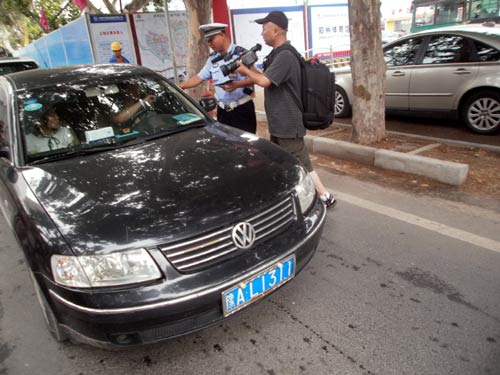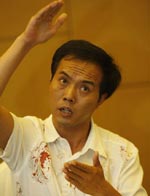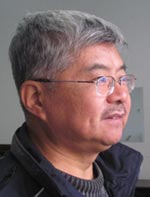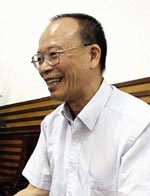Society
Heroic whistleblowers take a stand for fellow citizens
By Li Li, Cui Jia and Qiu Quanlin in Guangzhou (China Daily)
Updated: 2010-10-28 09:22
 |
Large Medium Small |
Social crusaders are helping blow cover off corruption.
The name Zhong Jizhang, or the "Death-defying Grandpa", is one of the most popular searches on the Internet these days in Guangzhou.
After the veteran engineer exposed safety problems covered up during the expansion of the Guangdong provincial capital's subway system, he has become a hero among netizens. However, Zhong is just one of many whistleblowers now making headlines across China.
Whether it be capturing corruption with a camera or revealing wrongdoings with the written word, they are standing up for the rights of ordinary citizens - and holding officials to account for mistakes. Some risk their jobs, others their health; yet almost all are harnessing the power of the Internet.
"By watching and expressing opinions on government policies and their execution, citizens are helping the government," said Shi Weimin, a researcher with the Chinese Academy of Social Sciences' institute of political science.
"This behavior should be encouraged to help eliminate corruption and promote democracy," he added.
China Daily talks to four whistleblowers about their methods, their motivations and their experiences.
|
Lu zooms in on bad drivers
Lu Jianfu's outfit is designed for optimum efficiency: a green photographer's vest with bulging pockets, a heavily loaded black backpack and a small video camera with the lens uncapped. He is ready to shoot at anytime, he said, perfect for his day job with a Henan provincial television station and even better for his personal campaign to capture corruption on camera. The 46-year-old has posted almost 800 videos online since 2007, with most featuring policemen, judges, prosecutors and other officials using public vehicles for personal use, violating traffic rules and insulting law enforcement officers. His blog at 56.com, a Chinese video-sharing website, has attracted more than 40,000 unique visitors, with his videos played more than 14 million times. Nicknamed "Trash Rake", at least 10 officials have been punished or sacked after being exposed by Lu's camera. "I hate to see abuse of power," he said from his home in the city of Zhengzhou. "(Corrupt officials) have to be stopped." Lu's mission began three years ago when he saw a black Audi car sporting a police warning light block drive the wrong way down a one-way lane. Several passenger-filled buses were blocked but the Audi driver refused to reverse, telling traffic police his car "didn't have a reverse gear". As he was stuck in the jam, Lu filmed the incident and posted it online. "I just wanted to show people how ridiculous the driver was," he said. To his surprise, netizens responded furiously. A week later, it emerged the Audi driver worked for the Zhengzhou government and he was sacked. "I was thrilled about finding a way to punish corrupt officials," said Lu, who started to look out for cars with special number plates that indicate they are government vehicles. "I was quite chicken at first, so I stood a distance away (while filming)," he said, although he has since grown to like confrontation. "I know there are many people doing what I do but I'm probably the only one standing face to face with them." Lu explained some officials lie and say they are on government business, while others threaten to use their powerful connections to stop the video being broadcast on television. "I love to see their expression when I mention the Internet," he said. Despite winning fans, Lu also has his share of enemies. His cameras are often broken and he has been attacked several times. "I cut my hair short so (people) can't pull it in fights. It really hurt the last time," he said. Because of death threats to his family, Lu has also been unable to eat in a restaurant or go shopping for years. Quitting, however, is not an option. "My wife says I'm stubborn as a mule," he said. "I just can't keep silent. This is my responsibility." His videos have also motivated many of his online chat group. "What Lu does has enlightened us," said sales manager Wang Kai, 39. "The grassroots can hold high-ranking officials to account." However, Lu is happy to report he is catching fewer and fewer officials these days. "I believe officials are becoming more self-disciplined ... because people like me could jump out from nowhere at any time," he added. |
|
Putting people ahead of business
In a city filled with businessmen attempting to build private empires, Xiao Gongjun cannot help but stand out. The owner of a printing factory in Dongguan, an industrial hub of Guangdong province, he is more interested in exposing government mistakes than boosting revenues. "I'm a straightforward person," said Xiao. "Whenever I see unfairness or wrongdoing, I speak out." Since September 2008, he has written more than 80 comment pieces for newspapers like the Southern Metropolis Daily, Dongguan Daily and Xinkuai News, most of them critical of the city government's performance on areas from economy and education to justice and social welfare. Yet, politics was of little interest to the 45-year-old before the flood that struck Dongguan two years ago. "I was never political," said Xiao, "but sometimes politics finds you when you're not looking." Storms in the summer of 2008 caused a reservoir on Hanxi River to burst its banks, flooding Xiao's factory. The disaster cost the company more than 1.3 million yuan ($195,000). Xiao believed Dongguan's water resources bureau had made a mistake in not issuing warnings before the flood, prompting him to complain. In response, officials told him to "blame the sky" and refused his calls for compensation. Disappointed, Xiao picked up his pen. In March 2009, he wrote a commentary in one newspaper attacking Dongguan's selection as one of China's best cities for public order, made after police cracked 2,931 criminal gangs between 2007 and 2009. "The city doesn't deserve the title. I have reported dozens of crimes in the last 10 years. None were solved," he said, adding his friends had all suffered thefts and robberies, too. And when official reports cheered the city's achievements in increasing the number of colleges and students, Xiao wrote criticizing the standard of facilities and graduates, referring to his personal experiences in recruiting staff. "I haven't seen any other businessmen like him," said Chen Weihua, city correspondent for Southern Metropolis Daily. "Most just keep their mouths shut for fear of affecting their own interests. Xiao really wants to make a difference." Xiao has never stopped demanding answers from the water resources bureau (he took them to court last year) and eventually got officials to agree a meeting on July 13 this year, more than two years after the flood. He invited several media organizations, as well as Meng Hao, a member of the Guangdong standing committee of the Chinese People's Political Consultative Conference. "(Xiao) is very good at utilizing resources like me to defend his rights as a citizen," Meng told China Daily. "We hope more people can be like him, actively communicating with the government." Today, authorities in Dongguan have adjusted working procedures based on Xiao's suggestions and have promised to alert the public before any necessary actions. However, Xiao's success has come at the price: his business. "I've tried to persuade him to spend more time on his factory," said friend Wu Kai, owner of a nearby chemical factory, "but he just wouldn't stop writing." For Xiao, stopping is not an option. "I'm lucky I can write," he said, pointing out the city has many migrant workers who go unheard. "I need to keep writing, to reflect the complaints of everyone." |
|
'It's every citizen's duty to stand up'
The retired teacher hit the headlines in December last year when he threw a half-empty plastic bottle of water at Yang Hui, deputy director of Harbin's bureau of commodity prices, during a government hearing to discuss a proposed water rate hike. "I had no choice but to throw something, otherwise they wouldn't have let me speak," said Liu, one of 12 "resident representatives" invited to the hearing in the capital of Northeast China's Heilongjiang province. "I couldn't understand why none of the other (representatives) opposed the price hike, especially as 99 percent of Harbin citizens I had talked to all objected," he said. He used his speech to protest and accuse Harbin Water Company of providing a poor service (Yang later said Liu was given about 9 minutes to talk instead of the usual 5 minutes). He also accused his fellow representatives of being government workers. However, officials agreed to the price increase. Liu's principal is based on the belief that authorities should "learn to put people first by accepting, respecting and protecting rights". In 2006, he tried to take Shi Zhongxin, then-mayor of Harbin, to court for the alleged misconduct of his government. The city's courts refused to file his case. "I don't really care about the result when I defend people's rights, I just want my voice heard. It's what everyone should do," said Liu. Most people turn a blind eye to wrongdoing, especially by officials with governments or State-owned enterprises, he complained, adding that people fear it is not possible to take on "powerful giants". In 2004, Liu discovered Agricultural Bank of China was charging customers 10 yuan ($1.50) a year for using natural gas top-up cards, even though the gas provider was already paying for the service. "Ten yuan is nothing but Harbin has around 1 million households, which means the bank was getting an extra 10 million yuan every year. It's not right," said Liu. He began to collect evidence and, just before court proceedings began, Agricultural Bank of China decided to refund the fee and has since scrapped the charge. "If I didn't stand up against the (rights violation), who knows how long the bank would've charged us," he said. "It's a citizen's obligation." Many Harbin residents have hailed Liu's efforts - "He speaks for us and truly represents us," one city bus driver told China Daily - while others believe he is simply out to gain publicity. Liu said China needs more whistleblowers. "Our purpose is to see China become a better country. Authorities should learn to admit mistakes and provide solutions instead of hiding the truth," he said. Yan Hongqian in Harbin contributed to this story. China Daily |
|
Firm willexpose concrete problems
"The name is meaningful," said the 68-year-old. "It makes me feel more responsible about letting the public and officials know the problems." The veteran engineer risked his job (and some say his life) two months ago when he exposed a cover-up involving an ongoing subway network expansion in Guangzhou, capital of Guangdong province. As an employee with the independent Guangzhou Huijian Center of Engineering Quality and Safety Monitoring, he discovered flaws in the concrete work that had been passed in previous inspection tests for the northern extension of Metro Line 3. "It had been given the all clear (by inspection staff members) despite substandard quality," Zhong told China Daily. "I knew how dangerous it would be after exposing it but my conscience kept telling me not to cover up the flaw. I needed to speak out." In 2009, Zhong was ordered to withdraw the original inspection report and take no further part in the tests. He refused and was subsequently removed from his post as deputy director of the engineering center's inspection team. He said his salary was reduced and he was threatened with the sack. Despite the pressure, Zhong knew he had to blow the whistle - yet he had no idea how to do it until he learned about the power of the Internet. With help from friends, in August this year he opened a blog account with Sina, a popular Chinese news website, and released a statement revealing that two tunnels used by subway construction crews for work and emergency purposes had substandard concrete work. "I used the blog because I wanted more feedback from the public and the media," said Zhong, who posted the original inspection documents and photographs he had taken of the tunnels. "I wanted to let everyone know the truth, so that there are no cover-ups," he added. In response to the post, the city's urban and rural construction commission issued a statement insisting that the concrete issue will have "no decisive impact" on the overall quality of construction. The commission confirmed Guangzhou Metro Corporation had asked the expansion project's designer to evaluate structural safety after finding the flaw in October 2009. It concluded the tunnels met all requirements. However, tests by two independent companies hired by Metro Corp and the construction company, Beijing Chang Cheng Bilfinger Berger Construction Engineering, discovered concrete in passages that failed to meet the design specifications. "A company driven by profits ... should not be involved in quality supervision for such a big construction project," said Zhong, who added that commission officials asked the design company to conduct another inspection several days ago. "An overall survey is expected in the near future," he said. "I have been told by my company to speak little about the project." China Daily |



